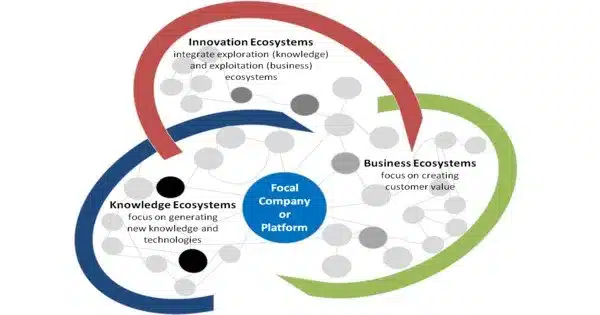The “knowledge ecosystem” is a linked network of numerous elements and individuals that contribute to the development, sharing, and use of knowledge within a certain area or community. The concept of a knowledge ecosystem is a knowledge management method that claims to promote the dynamic evolution of knowledge interactions between entities in order to improve decision-making and innovation via improved evolutionary collaboration networks.
Individuals, organizations, technologies, and information resources are among the various components. The purpose of a knowledge ecosystem is to promote the flow of information and expertise while also creating a dynamic environment for learning, creativity, and problem resolution.
In contrast to simply directive management initiatives that seek to govern or direct outcomes, knowledge digital ecosystems advocate for knowledge strategies that focus on facilitating self-organization in response to changing surroundings. The degree of “fitness” of a knowledge ecosystem is defined by the applicability of its knowledge to the problems it faces. Articles on such ecological techniques frequently include parts of complex adaptive systems theory. The Canadian government is one example of a known implementation consideration for the knowledge ecosystem.
Key elements
To comprehend knowledge ecology as a productive operation, it is useful to consider the knowledge ecosystem at its core. These information ecosystems, like natural ecosystems, have inputs, throughputs, and outputs that interact in an open exchange with their environs.
Multiple layers and levels of systems can be combined to create a comprehensive ecosystem. These systems are made up of interconnected information resources, databases, human experts, and artificial knowledge agents that work together to deliver online knowledge for performing organizational tasks at any time and from any location. The ability to access knowledge at any time and from any location blurs the distinction between learning and work performance. Both can occur concurrently and sometimes interchangeably.
Key components of a knowledge ecosystem may include:
- People: Individuals within the ecosystem who possess knowledge and expertise. This can include experts, researchers, practitioners, educators, and learners.
- Organizations: Institutions, companies, universities, research centers, and other entities that play a role in generating, disseminating, or applying knowledge.
- Information Resources: Databases, libraries, publications, digital repositories, and other sources of information that contribute to the overall knowledge base.
- Technologies: Tools, platforms, and systems that support the creation, organization, and dissemination of knowledge. This includes communication technologies, collaboration tools, and information management systems.
- Processes: Workflows, methodologies, and practices that govern how knowledge is created, shared, validated, and applied within the ecosystem.
A healthy knowledge ecosystem encourages collaboration, creativity, and constant learning. It thrives on exchanging ideas, validating knowledge through peer review, and applying findings to real-world problems. The concept is especially significant in fast changing industries like science, technology, and innovation. Organizations and communities that actively maintain and nurture their knowledge ecosystems are better positioned to respond to change and promote advancement in their particular fields.















